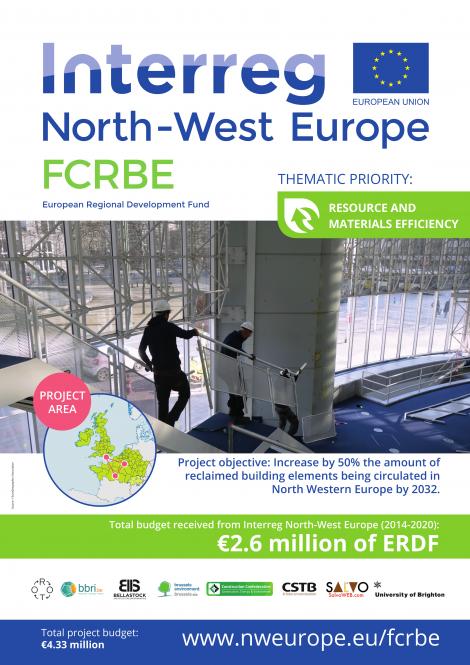Interreg NWE - FCRBE
Facilitating the circulation of reclaimed building elements in Northwestern Europe
Since January 2019, Rotor is leading an Interreg NWE project entitled FCRBE - Facilitating the circulation of reclaimed building elements in Northwestern Europe.
Today in NW-Europe, only 1% of building elements are reused following their first application. Although a large number of elements are technically reusable, they end up being recycled by crushing or melting, or disposed. The result is a high environmental impact and a net loss of economic value.
This project aims to increase by +50%, the amount of reclaimed building elements being circulated on its territory by 2032. Focusing on the northern half of France, Belgium and the UK, the project also covers, with a lesser intensity, the Netherlands, Ireland, the rest of France and Luxembourg. This area houses thousands of SMEs specialised in the reclamation and supply of reusable building elements. Despite their obvious potential for the circular economy, these operators face significant challenges: visibility, access to important projects and integration in contemporary building practices. Today, the flow of recirculated goods stagnate and may even decrease due to a lack of structured efforts. To respond appropriately to these challenges, the project sets up an international partnership involving specialised organisations, trade associations, research centres, an architecture school and public administrations. It is rooted in earlier initiatives that were successfully launched, on a local level. The project will deliver:
- 1 online directory that richly documents more than 1500 specialised reuse operators
- 1 pre-demolition audit method for reusable elements
- a set of 4 innovative specification methods for reclaimed products
- and much more!
These tools will be tested and promoted through 36 pilot operations taking place in large (de)construction projects, whereby more than 360 tons of elements will be reused. Effective communication efforts towards the stakeholders of the construction industry (including public authorities) will facilitate a smooth integration of these outputs into field practices and policies.
All documentation generated during the project can be found on Opalis - Documentation.
Details
A project by
Michael Ghyoot, Léa Bottani-Dechaud, Lionel Billiet, Sophie Boone, Stijn Colon, Emmanuel Cortés Garcia, Nicolas Delaunoy, Lionel Devlieger, Gaspard Geerts, Cécile Guichard, Renaud Haerlingen, Louise Huba, Florence Meessen, Victor Meesters, Susie Naval, Sébastien Paulet, Catherine Plenevaux, Tom Schoonjans, Adeline Van Hoof, Victoria Van Kan, Arne Vande Capelle, Pierre-Yves Volont, with the support of the whole team.
Interns involved in this project:
Alex Basile, Beate Zavadska, Beatrice Godon, Célia Chaussebel, Émilie Tabart, Fien Deruyter, Margot Schurmans, Marie Annick Rabefiraisana, Melissa Garipuy, Raoul Nguety Wandji, Romane Lavoine and Victor Everaerts.
In partnership with
Belgian Building Research Institute, Bellastock, Bruxelles-Environnement, Centre Scientifique et Technique du Bâtiment, Construction Confederation, Salvo, and the University of Brighton. Between 2022 and 2023, three partners joined the Capitalisation effort: City of Utrecht, LIST, and TU Delft.
Funded by
Interreg North-West Europe: €3.7 millions of ERDF (including the capitalisation extension).
With co-funding from
Bruxelles-Environnement, Région de Bruxelles-Capitale, Ademe, OVAM (Vlaanderen Circulair), Région Île de France.













